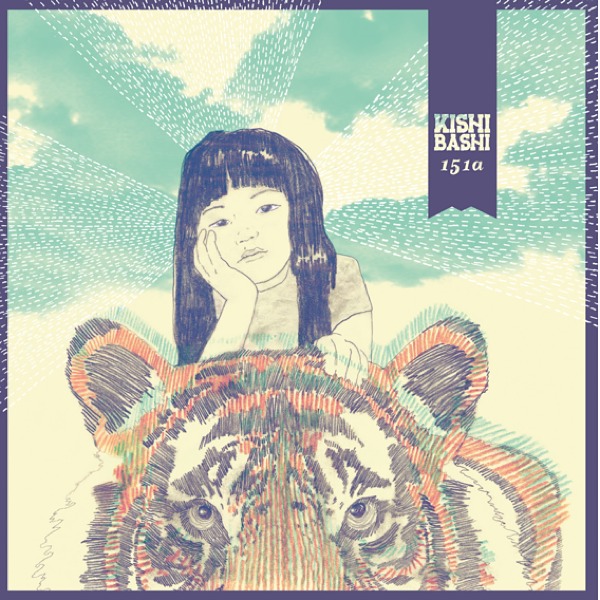It All Began With a Burst by Joyful Noise Recordings
Inaction is all part of the British mentality. You let the worst happen to you or around you, then go home, have a cup of tea, and think about what you would have said had you the mind to speak up for once in your life. Your existence gradually becomes a series of regrets about what you could have done, thinking about the reactions it would have provoked, and how glorious it all could have all been. You become bitter and/or depressed until you grow old, when you eventually die in a quiet annoyance at the state of the government, or something. The point is that British folk are terrible for making the most of a moment, and often let opportunities pass by them, in case doing might disrupt others, or cause some kind of nuisance.
They could well take a lesson from the title of Kishi Bashi’s debut album, 151a — which is pronounced “ichi-go-ichi-e,” and translates from an old Japanese phrase meaning to cherish that one moment. Despite the fact that there’s quite evidently a lot of detailed work been put into 151a, it all sounds like it’s all happening at the one moment, like you’re seeing all the mad, strange, colourful, intriguing stuff in his head all coming at you at once from all directions.
This onslaught of joyous noise, bright colours, and friendly textures is kept completely under control by Kishi Bashi (Kaoru Ishibashi). In fact, right from the start Ishibashi sounds like he’s taking it all in his stride, if not taming and riding the beast. On opening track “Intro/Pathos, Pathos” a flurry of drums and enthusiastically strummed guitars emerge from a wall of looping violins, stopping only briefly so you can catch up, before a squiggly bass line ups the pace again. It’s a wonderful piece of chamber-pop that, if anything, acts a template for the material that follows.
151a is a pop album at heart, but the way Ishibashi goes about his crescendos, and constructs the material for his songs is done in a way that shouldn’t sound as appealing as it might on paper. The trickling and affected pizzicato loops on “It All Began With A Burst” don’t make for much on their own, but with those infectious handclaps and Ishibashi’s vibrant voice on top, the whole thing really just sounds wonderful — and when that slick bass line kicks in, things only get better. Any other artist performing “Manchester” might make a solid effort, but in Ishibashi’s hands the climax sounds like it’s coming from a completely different direction, with a force you never expected. Elsewhere there’s just something ineffably mystifying about the way he sings the cadences on “I Am the Antichrist to You,” or how he can throw weight on a seemingly random line, like “When Pluto was demoted I felt a sigh of relief/ I never knew why” on “Wonder Woman, Wonder Me.”
The only real reason I can see to fault the album is its brevity. A runtime that just exceeds a half hour is perfectly fine, but considering I was already familiar with two of these tracks from Ishibashi’s Room For Dream EP — “Manchester” and “Bright Whites” — there is pining for more material that emerges when the final track fades away in the final minutes. At the same time, though, I’d say one of the favourable points of the album is how tight everything is – not a moment sounds wasted here, not even the three minute outro on final track “Beat The Bright Out of Me,” where drones of ringing violins and stretched out voices go in and out of focus (a result of spending a little too much time with Kevin Barnes when he was recording Paralytic Stalks, perhaps?). If anything, it feels like a settling, a calming of the storm, but once it’s done, there’s part of me which would like for another act to start up.
It’s a minor qualm, though, and one that won’t annoy many too people. “Manchester” and “Bright Whites” still sound great, if not better than before. And that’s a definite plus point of the album: it sounds absolutely brilliant. From the handclaps on “It All Began With A Burst,” to the blasts of vocals on the dizzyingly brief “Chester’s Burst Over The Hamptons,” to the drums on “Bright Whites,” which sound like fireworks going off, to the elongated flourishes on the zither, it all sounds sublime, right down to every pluck of on the violin strings. His ideas and stories might be a bit odd at times — “Atticus, In the Desert” — but it never sounds unappealing. To a foreign ear (like mine), the Japanese words and sounds come off a bit nonsensical when sang in syllabic bursts, but it still sounds friendly. Everything on 151a is mixed so that every sound is waiting to be heard. Every cherished moment is ready and waiting for you to hear it.

